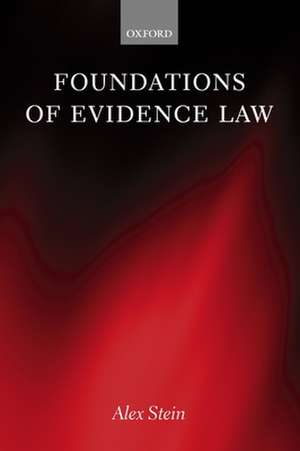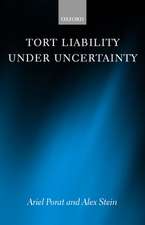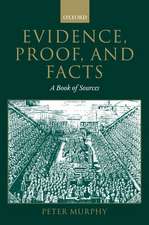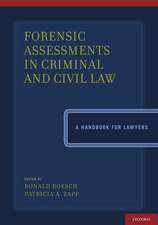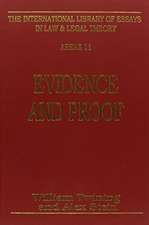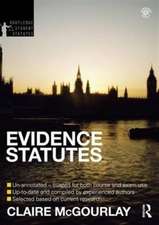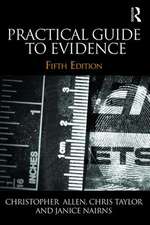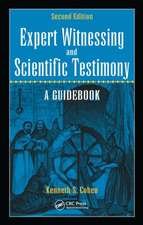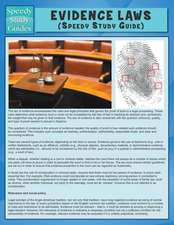Foundations of Evidence Law
Autor Alex Steinen Limba Engleză Hardback – 25 aug 2005
Preț: 715.74 lei
Preț vechi: 1084.89 lei
-34% Nou
Puncte Express: 1074
Preț estimativ în valută:
136.95€ • 143.38$ • 113.32£
136.95€ • 143.38$ • 113.32£
Carte tipărită la comandă
Livrare economică 25-31 martie
Preluare comenzi: 021 569.72.76
Specificații
ISBN-13: 9780198257363
ISBN-10: 0198257368
Pagini: 264
Dimensiuni: 162 x 242 x 20 mm
Greutate: 0.55 kg
Editura: OUP OXFORD
Colecția OUP Oxford
Locul publicării:Oxford, United Kingdom
ISBN-10: 0198257368
Pagini: 264
Dimensiuni: 162 x 242 x 20 mm
Greutate: 0.55 kg
Editura: OUP OXFORD
Colecția OUP Oxford
Locul publicării:Oxford, United Kingdom
Recenzii
the most provocative of evidence books ... constitutes the most sophisticated and persuasive argument for enormously enhanced legal control over the evidentiary process in recent memory, and stands in marked contrast to the progression of the law of evidence in the Anglo-American world...Foundational to [Stein's] call for intense control over the evidentiary process is his deep insight that rules of evidence do not just do what they purport to do; they also allocate error, like it or not. He is right on this point... [he] articulates an elegant unified theory of evidence law ... From these theoretical perspectives, he brilliantly critiques various evidentiary rules...[and] provides a creative theoretical foundation for both civil and criminal litigation.
Without sharing all positions of Prof. Stein ... one has to salute the effort accomplished to prevent the law of evidence from oozing away in the lazy folds of the Cartesian spirit.
Alex Stein may be the Ronald Dworkin of evidence law. Foundations of Evidence Law ... offers an alternative to Bentham's influential evidentiary views...Like Dworkin's theory of law generally, Stein attempts to locate and justify the law of evidence within the domain of political morality, that is, to legitimate and justify the coercive state authority that the law of evidence helps to initiate. [The] "foundations" that Stein articulates seek to describe and explain... Anglo-American evidentiary practices in light of a few broad principles that in turn justify the practices in terms of political morality...a significant book [that] offers unique and powerful arguments regarding virtually every important evidentiary issue, and it pushes the debates regarding these issues forward.
Foundations of Evidence Law ... represents an important first attempt to base evidence doctrine on something more than armchair psychology, to provide a justification for and conceptual unity to what has hitherto been regarded as an incoherent patchwork of historical hangovers from outdated assumptions about fact-finding, and to make clear the value of probability theory. As such, it deserves to be read and engaged with by all evidence scholars, whether interested in evidence law alone or more widely in the processes of proof.
...Although this book contains much that is challenging and controversial, there can be little doubt that it is one of the most significant and stimulating monographs on evidence law to have been published in recent years.
[Foundations of Evidence Law] attempt[s] the monumental task of combining the contributions of the New Evidence Scholarship with those of doctrinal evidence lawyers and those who see evidence as encapsulating social values. Even works of partial synthesis are rarely encountered, and so Stein is to be congratulated on not only making an attempt to square the whole circle, but on making such a credible attempt. ... Stein has provided us with an extremely thoughtful and thought-provoking theory of evidence law. Both his objective and his conclusions are bold, and the reader is forced at every stage in the argument to consider whether she accepts the line that Stein takes, and why. Even if one does not accept that Stein's theory is uniquely correct, it is difficult not to accept that it is at least valid.
Without sharing all positions of Prof. Stein ... one has to salute the effort accomplished to prevent the law of evidence from oozing away in the lazy folds of the Cartesian spirit.
Alex Stein may be the Ronald Dworkin of evidence law. Foundations of Evidence Law ... offers an alternative to Bentham's influential evidentiary views...Like Dworkin's theory of law generally, Stein attempts to locate and justify the law of evidence within the domain of political morality, that is, to legitimate and justify the coercive state authority that the law of evidence helps to initiate. [The] "foundations" that Stein articulates seek to describe and explain... Anglo-American evidentiary practices in light of a few broad principles that in turn justify the practices in terms of political morality...a significant book [that] offers unique and powerful arguments regarding virtually every important evidentiary issue, and it pushes the debates regarding these issues forward.
Foundations of Evidence Law ... represents an important first attempt to base evidence doctrine on something more than armchair psychology, to provide a justification for and conceptual unity to what has hitherto been regarded as an incoherent patchwork of historical hangovers from outdated assumptions about fact-finding, and to make clear the value of probability theory. As such, it deserves to be read and engaged with by all evidence scholars, whether interested in evidence law alone or more widely in the processes of proof.
...Although this book contains much that is challenging and controversial, there can be little doubt that it is one of the most significant and stimulating monographs on evidence law to have been published in recent years.
[Foundations of Evidence Law] attempt[s] the monumental task of combining the contributions of the New Evidence Scholarship with those of doctrinal evidence lawyers and those who see evidence as encapsulating social values. Even works of partial synthesis are rarely encountered, and so Stein is to be congratulated on not only making an attempt to square the whole circle, but on making such a credible attempt. ... Stein has provided us with an extremely thoughtful and thought-provoking theory of evidence law. Both his objective and his conclusions are bold, and the reader is forced at every stage in the argument to consider whether she accepts the line that Stein takes, and why. Even if one does not accept that Stein's theory is uniquely correct, it is difficult not to accept that it is at least valid.
Notă biografică
Alex Stein is Professor of Law at the Benjamin N. Cardozo School of Law, New York.
